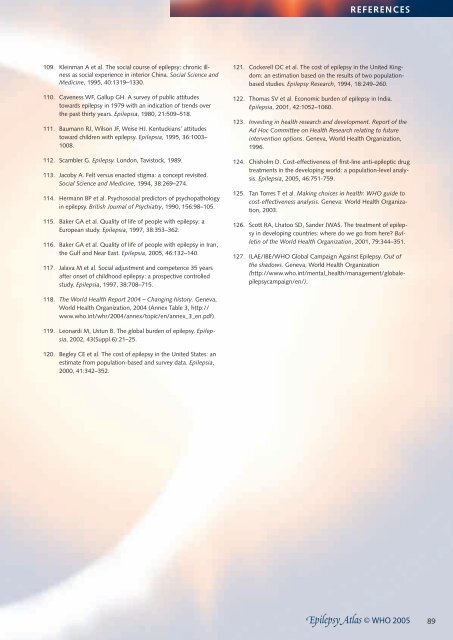Epilepsy - World Health Organization
Epilepsy - World Health Organization
Epilepsy - World Health Organization
Create successful ePaper yourself
Turn your PDF publications into a flip-book with our unique Google optimized e-Paper software.
109. Kleinman A et al. The social course of epilepsy: chronic illness<br />
as social experience in interior China. Social Science and<br />
Medicine, 1995, 40:1319–1330.<br />
110. Caveness WF, Gallup GH. A survey of public attitudes<br />
towards epilepsy in 1979 with an indication of trends over<br />
the past thirty years. Epilepsia, 1980, 21:509–518.<br />
111. Baumann RJ, Wilson JF, Weise HJ. Kentuckians’ attitudes<br />
toward children with epilepsy. Epilepsia, 1995, 36:1003–<br />
1008.<br />
112. Scambler G. <strong>Epilepsy</strong>. London, Tavistock, 1989.<br />
113. Jacoby A. Felt versus enacted stigma: a concept revisited.<br />
Social Science and Medicine, 1994, 38:269–274.<br />
114. Hermann BP et al. Psychosocial predictors of psychopathology<br />
in epilepsy. British Journal of Psychiatry, 1990, 156:98–105.<br />
115. Baker GA et al. Quality of life of people with epilepsy: a<br />
European study. Epilepsia, 1997, 38:353–362.<br />
116. Baker GA et al. Quality of life of people with epilepsy in Iran,<br />
the Gulf and Near East. Epilepsia, 2005, 46:132–140.<br />
117. Jalava M et al. Social adjustment and competence 35 years<br />
after onset of childhood epilepsy: a prospective controlled<br />
study. Epilepsia, 1997, 38:708–715.<br />
118. The <strong>World</strong> <strong>Health</strong> Report 2004 – Changing history. Geneva,<br />
<strong>World</strong> <strong>Health</strong> <strong>Organization</strong>, 2004 (Annex Table 3, http://<br />
www.who.int/whr/2004/annex/topic/en/annex_3_en.pdf).<br />
119. Leonardi M, Ustun B. The global burden of epilepsy. Epilepsia,<br />
2002, 43(Suppl.6):21–25.<br />
120. Begley CE et al. The cost of epilepsy in the United States: an<br />
estimate from population-based and survey data. Epilepsia,<br />
2000, 41:342–352.<br />
REFERENCES<br />
121. Cockerell OC et al. The cost of epilepsy in the United Kingdom:<br />
an estimation based on the results of two populationbased<br />
studies. <strong>Epilepsy</strong> Research, 1994, 18:249–260.<br />
122. Thomas SV et al. Economic burden of epilepsy in India.<br />
Epilepsia, 2001, 42:1052–1060.<br />
123. Investing in health research and development. Report of the<br />
Ad Hoc Committee on <strong>Health</strong> Research relating to future<br />
intervention options. Geneva, <strong>World</strong> <strong>Health</strong> <strong>Organization</strong>,<br />
1996.<br />
124. Chisholm D. Cost-effectiveness of first-line anti-epileptic drug<br />
treatments in the developing world: a population-level analysis.<br />
Epilepsia, 2005, 46:751-759.<br />
125. Tan Torres T et al. Making choices in health: WHO guide to<br />
cost-effectiveness analysis. Geneva: <strong>World</strong> <strong>Health</strong> <strong>Organization</strong>,<br />
2003.<br />
126. Scott RA, Lhatoo SD, Sander JWAS. The treatment of epilepsy<br />
in developing countries: where do we go from here? Bulletin<br />
of the <strong>World</strong> <strong>Health</strong> <strong>Organization</strong>, 2001, 79:344–351.<br />
127. ILAE/IBE/WHO Global Campaign Against <strong>Epilepsy</strong>. Out of<br />
the shadows. Geneva, <strong>World</strong> <strong>Health</strong> <strong>Organization</strong><br />
(http://www.who.int/mental_health/management/globalepilepsycampaign/en/).<br />
89

















